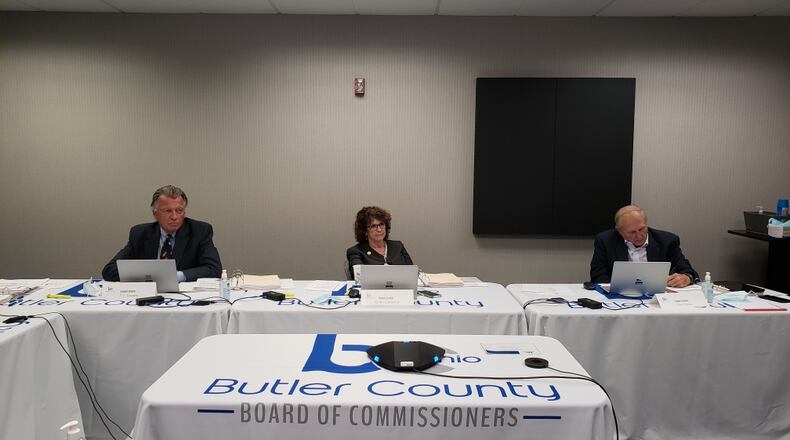During recent meetings, tempers flared while discussing the money and process for distributing for it. The U.S. Treasury requires periodic progress reports on expenditures and the first was due Aug. 31. The commissioners haven’t allocated any of the money yet so County Administrator Judi Boyko prepared a 15-page document that gives a general overview of how the county will use the funds to make an impact.
It discussed how they will address the five main categories the Treasury identified as important which are: public health, negative economic impacts, services to disproportionately impacted communities, premium pay for workers battling the pandemic, revenue replacement and improvements to water and sewer and broadband infrastructure.
“The performance report reflects the board’s intentions, your potential for and aspirations for the use of this funding,” Boyko said. “Specifically to mitigate present and imminent demands, while recognizing the extended burden of COVID has not been fully determined or realized, and that the board of commissioners may intend to spend this financing in a long-term horizon outlook.”
Commissioner Cindy Carpenter was not pleased with Boyko’s submission and said it should have basically been one sentence: “We’re working on it.” Boyko said she wanted to capture the commissioners’ general “aspirations” for the money in the report which will be posted and available for the public to view.
“I know I was not consulted about what my aspirations are,” Carpenter said. “I attended meetings for almost all of the groups that are presenting requests for representing communities of color, or those who have been disproportionately affected. I know you may have pulled it from somewhere, I’m just not recognizing where or how any of this reflects my aspirations for Butler County.”
Carpenter has been crisscrossing the county for months meeting with local officials to get their thoughts on how the money should be spent. She wrote a 24-page description of 21 projects and how they fit into the intent and guidelines of the ARP windfall.
Carpenter’s comments prompted Commissioner T.C. Rogers to accuse her of shutting him out of the process. He said she gave Commissioner Don Dixon a binder containing all the proposals she compiled but did not provide him one. He said Carpenter is upset because the commissioners didn’t submit her plan verbatim.
“When you say that you didn’t participate in this, I know you already had a plan which you thought was already complete and was supposed to be submitted as-is by Aug. 31,” Rogers said adding he was unwilling to approve her plan with so little time to review it after he received a copy.
Carpenter said she thought she gave Rogers her plan and she never thought it was supposed to be the finished product to submit to the Treasury.
The pair locked horns again during a Wednesday work session with groups seeking funding. The county’s development director, David Fehr, was presenting a plan for $1.3 million to build a new taxiway and 10 hangars for corporate planes at the county-owned airport. He said the project would qualify because it is within a low-to-moderate income area.
Carpenter asked how this project would help the underprivileged population. He said it would create new jobs for people in that area. She still criticized the project.
“I do not think this in any way qualifies as lifting up those communities, communities of color, communities who have been struggling, I think it’s really unfair to say it’s in a qualified census tract so we need the money...,” Carpenter said adding the project should be funded by the county general fund not ARPA funds. “I’m sad to see what appears to be kind of a money grab.”
Rogers challenged Carpenter’s characterization of the project saying, “I didn’t know we were going to start voting on the individual projects right after they were heard, is that starting now.” She said no.
Dixon told the Journal-News all three of them are keenly aware this is a large responsibility.
“When you’re talking about $75 million bucks you get all kinds of pressure from different people and organizations who want a part of that,” Dixon said. “You know they can all come up with a good story and a good plan, but everybody’s got an idea and most of them don’t work. So you have to vet this stuff very carefully and look at what you can deliver and serve that can’t ever happen any other way.”
Carpenter told the Journal-News she wants the board to make a final funding decision very quickly, “the rescue plan asks us to do something to get the funds out immediately.”
Dixon told the Journal-News there is no set timeline for approval. The federal deadline for spending the money is the end of 2024.
“We’re going to hear everybody first, listen to their requests,” Dixon told the Journal-News. “Then we’ll have to go through and see what is the best deal, best services for the county, helps the most people, then we’ll make a list, prioritize them and that’s when we’ll start funding.”
Boyko said there is another work session scheduled for next week and possibly one more the following week.
About the Author

